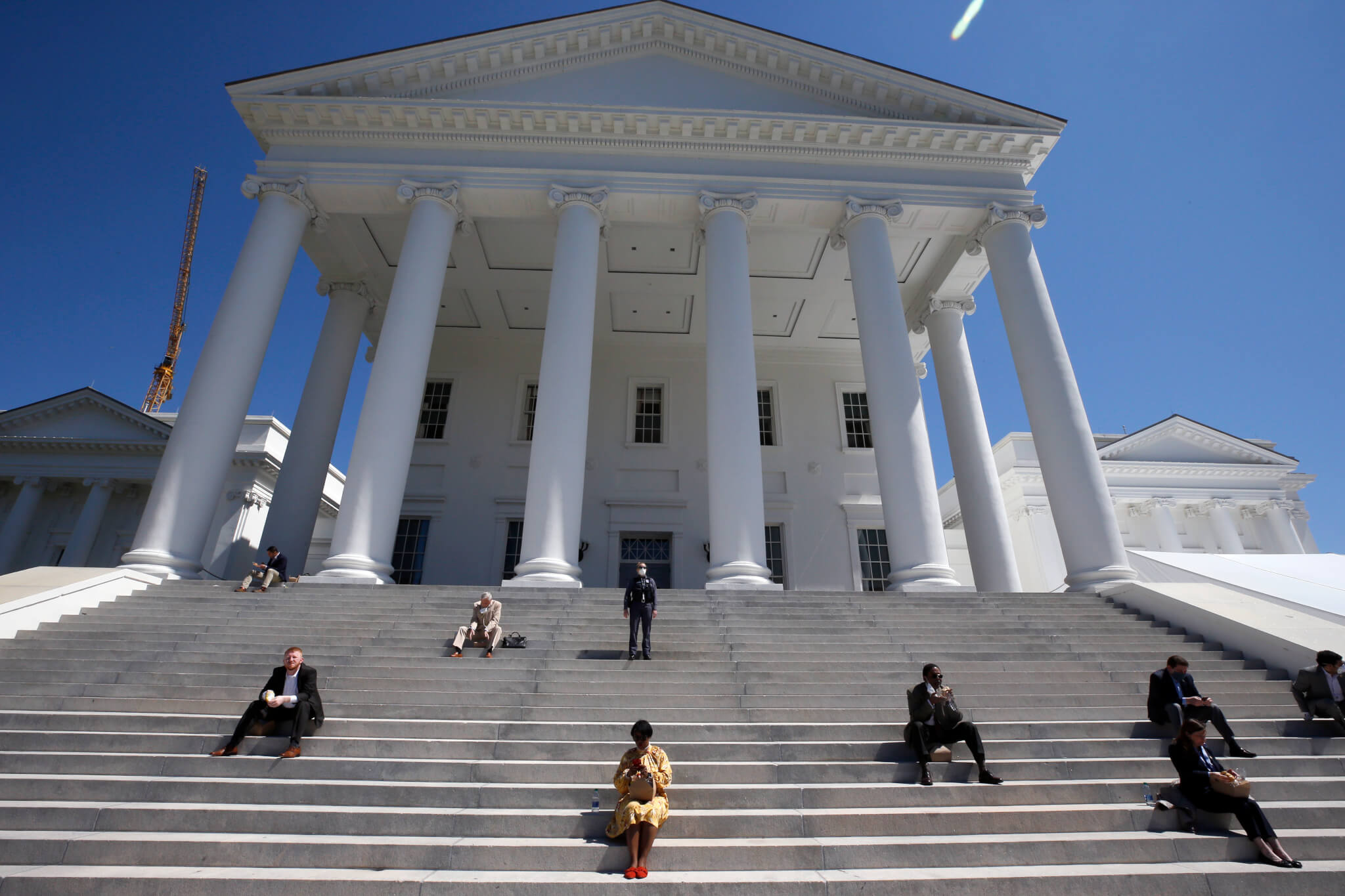
FILE - House of Delegates members eat boxed lunches on the steps of the Virginia Capitol in Richmond, Va., April 22, 2020. Even a short-term breach in the federal debt limit would rattle an already fragile state economy, Virginia finance staffers on Tuesday, May 16, 2023, told lawmakers, who say that looming uncertainty is now the main reason no budget deal is imminent. (Bob Brown/Richmond Times-Dispatch via AP, Pool, File)
State lawmakers and Gov. Glenn Youngkin have just a month to bridge a $1 billion gap in Virginia’s budget proposals. Here’s what’s going on, why it’s taking so long, key points of contention between the legislature and the governor, and what it means for Virginians.
As the federal government scrambles to avoid defaulting on the national debt, the Virginia government is facing its own looming fiscal deadline as state lawmakers grapple with each other and with the governor to agree on amendments to the commonwealth’s two-year budget ahead of the start of the new fiscal year, which begins on July 1. Currently, the state House and Senate are attempting to bridge a $1 billion gap between their respective proposals to amend the $177 billion two-year budget.
Virginia’s budget process isn’t supposed to go into figurative overtime, but some years it does, and 2023 is one of those years.
How did we get here?
Every even-numbered year, Virginia’s General Assembly passes a two-year budget. However, since state revenues can’t be reliably predicted two years in advance, that two-year budget undergoes an important amendment process in odd-numbered years, like 2023.
Each December, Virginia’s governor proposes either a full budget or amendments to the existing budget. Then state lawmakers convene in January for the legislative session, when they propose their own amendments to the governor’s proposal. If the state House and Senate can’t agree on a budget or amendments, leaders in each chamber appoint conferees to negotiate a compromise, typically by the end of the legislative session (March in even-numbered years, February in odd years).
The governor then proposes his own amendments to that budget agreement and can issue line-item vetoes within it. The legislature then accepts or rejects the governor’s changes when the reconvene for “veto session” in April or May.
Because the Democratic-majority state Senate and Republican-controlled state House couldn’t come to an agreement on budget amendments before the General Assembly session adjourned at the end of February, the conferees continued to meet to work towards a compromise after passing a stop-gap “skinny” budget to meet certain state requirements (e.g. making the annual deposit to Virginia’s “rainy day” fund) and to begin to plug the $201 million hole in the state’s education budget that resulted from an avoidable calculation error made by Youngkin’s Department of Education.
What’s going on now?
Frankly, not much.
At the beginning of May, the legislature’s budget conferees announced that they would wait on the outcome of the federal debt ceiling crisis to resume negotiations to bridge that $1 billion gap between their proposals.
But now that June has arrived and the federal government appears to be on the verge of raising the debt ceiling to prevent the US from defaulting on its debts, negotiations seem to be remaining in limbo.
Possible reasons for the lack of attention from some budget conferees to this crucial process include the retirement of some members and the fact that others are embroiled in primary battles (Virginia’s primary elections will be held on June 20).
What are the sticking points?
Negotiators from both parties want to include new tax cuts in the amended budget, but deep disagreements about the nature of those cuts and who would benefit from them remain. Youngkin and Republicans want to cut the corporate tax rate, while Democrats want to raise the standard income tax deduction, which would benefit Virginia taxpayers broadly, and cuts that benefit lower-income Virginians.
Negotiators from both parties want to direct more state resources at mental health investments, but debate remains over just how much to invest. The House budget proposal called for an extra $37 million, while the state Senate wants to invest an additional $50 million. Broadly agreed-upon uses for the additional investments include funding a school-based mental health pilot program, expanding local crisis centers that provide an alternative to hospitals for people seeking help, and establishing higher Medicaid reimbursement rates for certain behavioral health providers.
Education remains a major sticking point between each party’s conferees. Both parties want to increase school security funding, but they disagree on both the dollar amount and certain details. Both parties also want to respond to sharp drops in reading test results during the pandemic by expanding the state’s literacy program, but the Senate wants to spend almost twice as much on a reading specialist hiring initiative than the House.
The chambers and parties are reportedly in agreement regarding increasing teacher salaries; the current budget includes a 5% bump, but current proposals would increase that raise to 7%. Meanwhile, the vast majority of the $201 million school district funding hole created by the state Department of Education’s mistake still needs to be plugged – to the tune of $184.2 million, specifically.
Now what?
The good news is that state government will keep functioning even if lawmakers are unable to reach an agreement on budget amendments; the two-year budget passed in 2022 covers the upcoming fiscal year. If no compromise is reached, Virginia will begin the upcoming fiscal year with massive surpluses, but a huge opportunity to invest in priorities like mental health, meaningful tax reform, and education will be missed – and millions of Virginians would be shortchanged by Youngkin’s and the legislature’s failure.

VIDEO: Your support matters!
Your support matters! Donate today. @vadogwoodnews Your support matters! Visit our link in bio to donate today. #virginianews #virginia #community...

Op-Ed: Virginia’s new Democratic majorities pass key bills to improve your lives, but will Youngkin sign them?
The 2024 Virginia General Assembly regular session has wrapped up. It was a peculiar session from the outset, with Democratic majorities in the...

Op-Ed: Why Virginia Needs A Constitutional Amendment Protecting Reproductive Freedom
Virginia’s recent election season in 2023 drew in eyes from all over the country. Reproductive freedom was on the line and Virginia remained the...

From the state rock to the state flower, here’s how Virginia got its symbols
Have you ever wondered why the Dogwood is the state flower? Or how the cardinal became the state bird? We’re here to answer those questions and more...

VIDEO: Second-gentleman Douglas Emhoff gives speech on reproductive freedom
Second gentleman, Douglas Emhoff touched on reproductive freedom not only being a woman's issue but "an everyone's issue" during the Biden-Harris...

Glenn Youngkin and the terrible, horrible, no good, very bad night
Election Day 2023 has come and gone, and while there are votes to be counted, one thing is perfectly clear: Virginians unequivocally rejected Gov....





